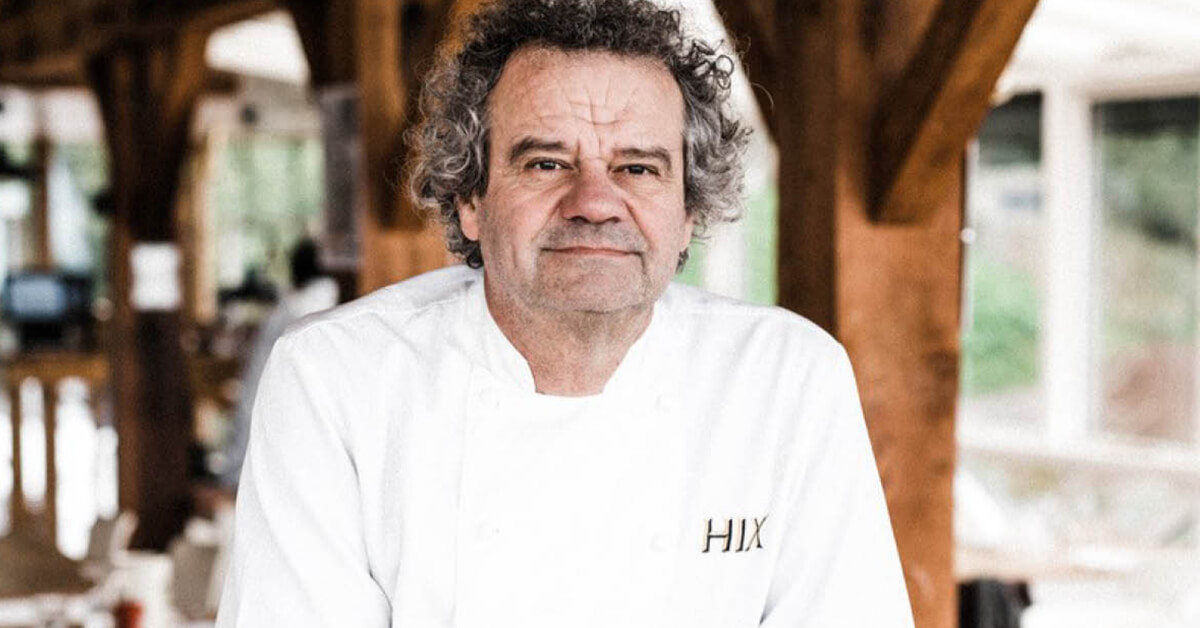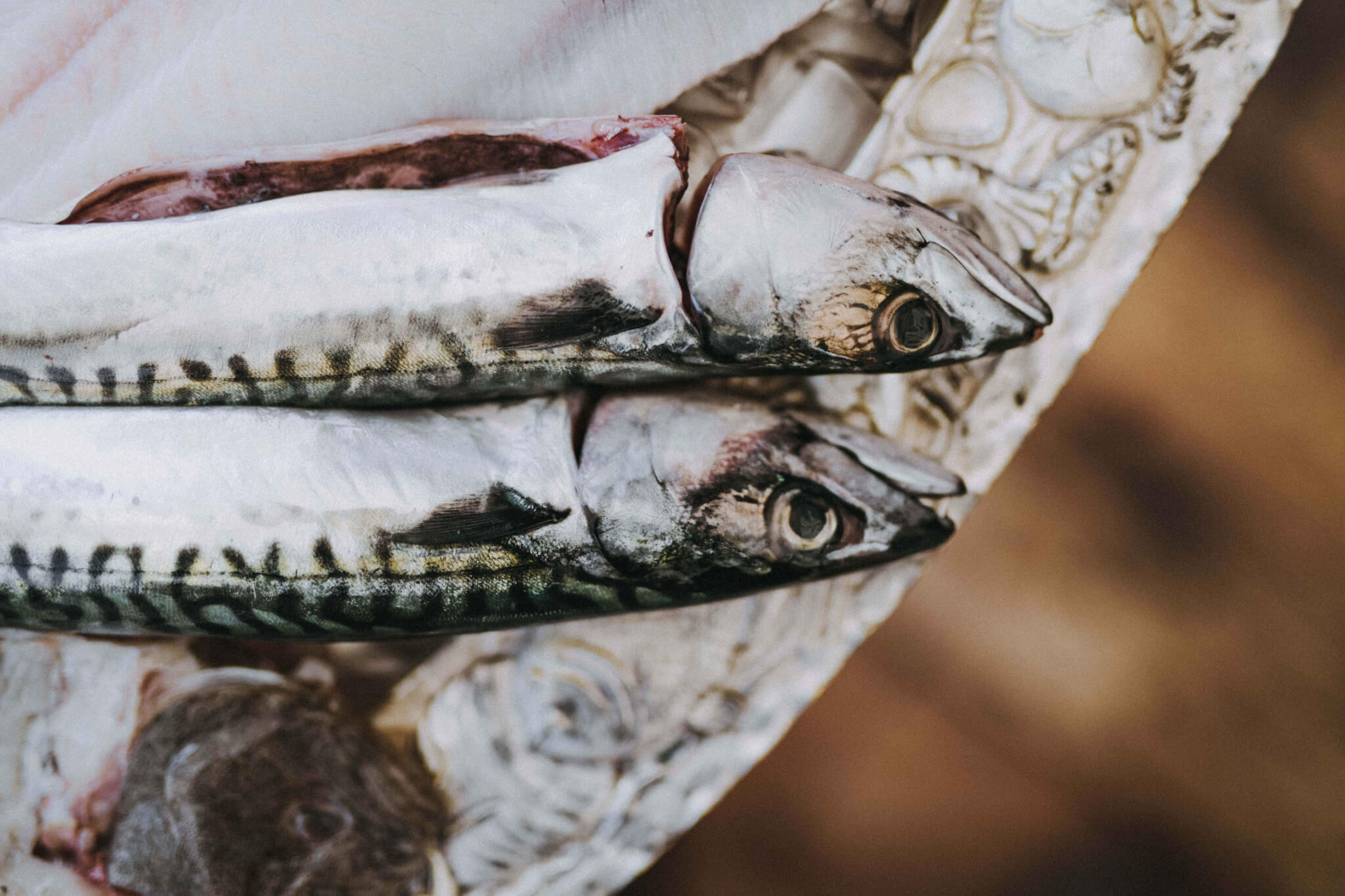-
Mark Hix Shares his Preserved Mackerel Recipe
11 September 2019The following is taken my Mark Hix’s new booked HOOKED: Adventures in Angling and Eating
A summer mackerel frenzy and false alarm back home in Dorset
I still fish for mackerel, as I did when I was a kid, but these days it’s normally from my boat in the summer. When the fishing is a bit grim, you are more or less guaranteed to catch mackerel. When they are so plentiful, I just catch enough for supper, or I may take a bucketful or more to the restaurant, where they will go to really good use. It’s always great to catch just what you need for supper and not to go too mad because, although mackerel are plentiful, it’s sensible to be aware of sustainability. Fishing isn’t about keeping everything you catch.
A few years back, when I started doing my Food Rocks festival in Lyme Regis, I would organize an interesting panel discussion based around topical fish chat, the ocean and sustainability. I’d invite a few like-minded people to discuss fishing and fish stocks, and basically thrash out current fishy subjects. Ironically, before the festival, the news was out in the press that mackerel were endangered, which I couldn’t quite believe or understand, as I’d been out the day before and caught 100 fish in 20 minutes. Those panel conversations are usually a little heated at times, especially when I mix up the panel a bit controversially and you have people like Charles Clover, an environmental journalist and keen fly-fisherman, who made the documentary film The End of the Line (see page 52), and representatives from the Blue Marine Foundation and the Marine Stewardship Council (MSC). Also, there was my good friend Mitch Tonks, who has different views on fishing, living as he does in the fishing port of Brixham and owning fish restaurants, Nigel Bloxham of the Crab House Café in Weymouth, Dorset, and Billy Winters from Portland.
When the mackerel subject kicked off, I obviously threw in the fact that I’d caught a bucketful in no time the day before and had to stop fishing, as it was getting boring. It’s interesting how heated these talks can get, especially when you have well-heeled, stubborn, old fishermen in the audience throwing swerve-ball questions at the panel. Everyone tends to walk away from those things none the wiser. Ironically, the following day we all found out that the mackerel news had been no more than a scam that had leaked out of Parliament, so that talk most certainly got ‘soused’. Until 2017, I would often go out alone, or with Nigel Hill, in search of inshore bass. When the fish are inshore, you can catch them really close in with light rods and lures like plugs. One summer, Nigel came out on my boat and we covered three wrecks about 13km (8 miles) out and caught nothing, so we went really close into the beach in Charmouth, Dorset, where we both live. Nigel hooked into a cracking fish, and then I lost it in the landing net. He smiled, swore and said I had better get a bigger landing net, which I did immediately.
There is now a ban on fishing for bass for anglers, which has upset a few of my friends locally. We now have to target species like cod, pollack and sea bream, which are good fun, although the bass give a bit of a harder fight. But, of course, Nigel can catch his quota as long as he’s fishing from his boat. I suppose the bass ban makes a bit of sense, but there are lots of arguments for and against it because commercial net fishermen can take a whole shoal in one hit, whereas anglers will pluck the bass out one at a time, which has very little impact on fish stocks. A lovely – and I suppose slightly luxurious – thing I started doing with mackerel a few years back, on one of those occasions I’d pulled out a few easy mackerel when the bass failed me for supper, was to preserve them in olive oil and herbs in preserving jars. I had already got the woodfired oven sparked up and invited friends round for a simple mackerel supper. When mackerel is straight out of the water, it’s one of the finest fish you can eat, with its slightly unusual and oily flesh, and lends itself to all sorts of different cooking techniques. I once mistakenly bought a jar of mackerel preserved in olive oil thinking it was tuna. When I eventually got round to opening the jar, I was pleasantly surprised. It undoubtedly tasted better than most canned tuna you can buy, and had that old-fashioned sardines-on-toast taste. I’ve since preserved my own mackerel on several occasions. It’s so simple to do and makes a really handy snack to tuck into on some hot toast with maybe a dash of horseradish sauce or some horseradish root freshly grated on top. I’ve often taken a jar to the riverbank and toasted some bread on the barbecue as a nice breakfast or early evening snack.
[Read our full interview with Mark Hix here.]

Preserved mackerel fillets
Makes enough to fill about 7–8 small preserving jars (125ml/4fl oz each) or 3–4 large preserving jars (250–350ml/9–12 l oz each)
This is a great way to preserve your catch and give the humble mackerel a touch of luxury. You can also use rapeseed oil in this dish and vary the flavourings. In the past, I’ve added chilli, cumin and fennel seeds. The jars of preserved mackerel make great little foodie gifts when given with some other homemade goodies. Bear in mind that once you’ve opened the jar, the fish won’t keep for more than a few days.
– 6 large mackerel, filleted, boned and skinned
– 1½ tablespoons sea salt
– ½ tablespoon freshly ground white peppercorns
– 500ml (18fl oz) extra virgin olive oil
– Toast or salad, to serve1. Sterilize the preserving jars by removing the rubber rings and putting them through the dishwasher, or by boiling them in a large saucepan of water for 10 minutes or so.
2. Cut each mackerel fillet into 3 or 4 pieces, season with the salt and leave to stand on a tray for 45 minutes–1 hour.
3. Scatter the fillets with the peppercorns and mix with about half the oil.
4. Pack the mackerel pieces loosely in the jars, about 2cm (¾ inch) from the top, then pour in the oil so that they are covered by about 1cm (½ inch) and seal the jars.
5. Stand the jars in a deep, wide-based saucepan (or cook them in a smaller pan in 2 or 3 batches) and cover them completely with water. Bring the water to the boil and simmer for 20 minutes for small jars and 30 minutes for large jars.
6. Carefully remove the jars from the water and leave to cool. Store in the refrigerator for up to 3 months
(unopened). Serve on toast or flaked into a salad.
- ABOUT SEARCYS
- About Searcys
- News
- All News
- The Bubbly Show 2025
- IBelong @ Searcys People Awards 2025
- Meet Our Talented Pastry Chef, Yvette Müller at The HAC!
- Celebrate Mother’s Day in Style with Searcys
- Searcys Welcomes Locatelli and Bar Giorgio to the National Gallery
- A Message From Paul on Employee Appreciation Day
- International Women’s Day at Searcys
- Barbican and Searcys Celebrate 35 years of Catering Partnership with Contract Renewal
- Restaurants and Bars
- Event Venues
- EVENT SPACES
- All Locations
- {10-11} Carlton House Terrace
- 30 Euston Square
- 41 Portland Place
- 116 Pall Mall
- Barber-Surgeons Hall
- Battersea Power Station
- Carpenters’ Hall
- Church House
- Gray’s Inn
- Horizon 22
- IET London: Savoy Place
- National Army Museum
- No. 11 Cavendish Square
- One Moorgate Place
- Saddlers’ Hall
- Searcys at The Gherkin
- EVENT SPACES cont.
- Searcys Bar and Brasserie at Surveyors House
- Stationers’ Hall
- St Pancras Bar & Brasserie
- Surveyors House
- The Barbican
- The HAC
- The Inner Temple
- The Portrait Restaurant By Richard Corrigan
- The Roman Baths and Pump Room
- The Royal Institution
- The View, Royal College of Surgeons of England
- Vintners’ Hall
- Event Types
- SEARCYS ROLLS-ROYCE
- Let Us Find Your Venue
- Event Catering
- What’s On
- Contact Us
- ABOUT SEARCYS
- About Searcys
- News
- All News
- The Bubbly Show 2025
- IBelong @ Searcys People Awards 2025
- Meet Our Talented Pastry Chef, Yvette Müller at The HAC!
- Celebrate Mother’s Day in Style with Searcys
- Searcys Welcomes Locatelli and Bar Giorgio to the National Gallery
- A Message From Paul on Employee Appreciation Day
- International Women’s Day at Searcys
- Barbican and Searcys Celebrate 35 years of Catering Partnership with Contract Renewal
- Restaurants and Bars
- Event Venues
- EVENT SPACES
- All Locations
- {10-11} Carlton House Terrace
- 30 Euston Square
- 41 Portland Place
- 116 Pall Mall
- Barber-Surgeons Hall
- Battersea Power Station
- Carpenters’ Hall
- Church House
- Gray’s Inn
- Horizon 22
- IET London: Savoy Place
- National Army Museum
- No. 11 Cavendish Square
- One Moorgate Place
- Saddlers’ Hall
- Searcys at The Gherkin
- EVENT SPACES cont.
- Searcys Bar and Brasserie at Surveyors House
- Stationers’ Hall
- St Pancras Bar & Brasserie
- Surveyors House
- The Barbican
- The HAC
- The Inner Temple
- The Portrait Restaurant By Richard Corrigan
- The Roman Baths and Pump Room
- The Royal Institution
- The View, Royal College of Surgeons of England
- Vintners’ Hall
- Event Types
- SEARCYS ROLLS-ROYCE
- Let Us Find Your Venue
- Event Catering
- What’s On
- Contact Us
Saved Venues0Stay Connected with Searcys
Sign up to receive updates on exclusive events, restaurant offers, and more from Searcys.
